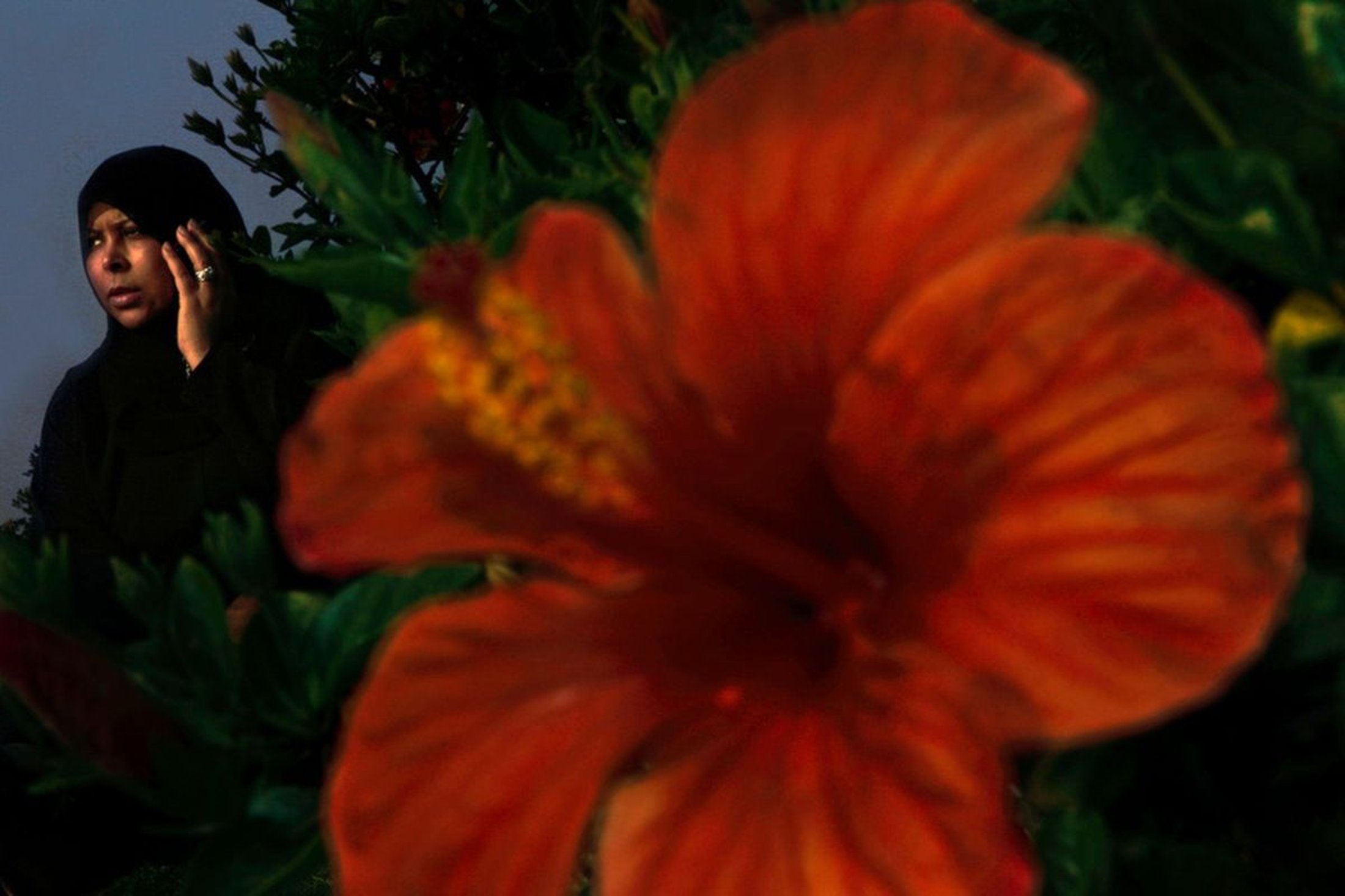A woman wears the hijab (sheer fabric covering her neck and hair) at al-Azhar Park in Old Cairo. The influx of women covering their hair in Egypt is a sign of a country in turmoil over its identity. The famous Egyptian Nobel Laureate Naguib Mahfouz once said: “If you want to move people, you look for a point of sensitivity, and in Egypt nothing moves people as much as religion." © Laura El-Tantawy
A boy carries a carpet on his shoulders in Old Cairo. With a 9.5 percent unemployment rate, much of the country's graduates walk out of university knowing they will not work in their field of study. The majority of the country's service sector employs university graduates - Cairo's taxi drivers are university graduates with degrees in law, medicine or engineering. © Laura El-Tantawy
An Egyptian flag silhouettes protesters striking their fists in the air and calling for the execution of former President Mohamed Hosni Mubarak and former Interior Minister Habib al-Adly outside the court where both were being tried on charges of corruption and giving orders to kill protesters. © Laura El-Tantawy
An Egyptian woman sandwiches her face in her hands while screaming the pain of what she said is Mubarak's false regime during an anti-government demonstration in downtown Cairo led by Kefaya "Enough" Movement. © Laura El-Tantawy
A wounded protester is carried away from the scene where clashes took place between pro-democracy demonstrators and security forces near Tahrir Square in Cairo. At least 6,000 people have been wounded in Egypt’s revolution and frequent clashes that have followed. © Laura El-Tantawy
An anti-Mubarak demonstrator receives treatment in a makeshift clinic set-up on a street corner behind Tahrir Square in Cairo on Wednesday February 2, 2011. Hundreds of pro-Mubarak supporters had redirected their demonstration towards Moustafa Mahmoud Square in the neighborhood of Mohandessen in Cairo and clashed with anti-government demonstrators who had been at Tahrir Square. © Laura El-Tantawy
A member of Egypt’s much loathed State Security forces stands among tens of his peers while guarding Parliament as the country’s new members were sworn in. The Muslim Brotherhood and the ultra conservative Salafi Nour Party have dominated the political scene in post-Mubarak Egypt. © Laura El-Tantawy
19-year-old Reda (Arabic word meaning ‘contentment’) was shot in his eyes on November 19, 2011. He was on Mohamed Mahmoud Street in central Cairo to support protesters. “I don’t remember feeling anything. I ran and knelt down to pick up a dead body. © Laura El-Tantawy
Safeya Sayed Shedeed, the mother of a protester who died after being shot by police on January 28, 2011, cries as she waits to hear the result of a sentencing trial for former president Hosni Mubarak and former Interior Minister Habib al-Adly who are being tried on charges of corruption and giving orders to kill protesters. “I want to avenge my son,” she said. “Who will get my son’s rights back?”
A man flashes a victory sign. © Laura El-Tantawy
A sand storm hovers over Cairo casting a layer of dust across the capital and bringing the city to a standstill. © Laura El-Tantawy
Passengers on a nine-hour journey between Cairo and the coastal city of Marsah Matrouh in Egypt stand amid the desert expanse during a rest stop. © Laura El-Tantawy
People walk on the street in Old Cairo. Egypt is a nation in transition - caught between a pull to the liberal and modern influences of the west and an opposing pull towards the country's deeply rooted history, culture and religion, it is in turmoil over its identity as its future looms uncertain. © Laura El-Tantawy
A weary-looking shoe repairman sits in his shop in the neighborhood of El Hussein in Cairo. With 9.5 percent unemployment rate, much of the country's graduates walk out of university knowing they will not work in their field of study. The majority of the country's service sector employs university graduates. © Laura El-Tantawy
Couples sit in the shade of a tree at a park in Cairo. © Laura El-Tantawy
A young couple looks over the Cairo skyline as sunset ushers in. Bowing to religious and cultural norms, couples are not allowed to engage in premarital sex, but with marriage becoming more difficult given the high costs associated with wedding, dowry and housing preparations, marriage has become something enjoyed only by those who can afford it. © Laura El-Tantawy
Military jets fly in formation over downtown Cairo one day after the removal of president Mohamed Mursi, the country's first democratically elected president. © Laura El-Tantawy
A man takes a photograph in a park in Old Cairo as the sun sets. © Laura El-Tantawy
Night scene in Cairo's Tahrir (Liberation) Square where anti-government demonstrators have staged a sit-in protest demanding the government step down. © Laura El-Tantawy
A group of youngsters on the street in Old Cairo. © Laura El-Tantawy
A full moon hovers over Cairo. © Laura El-Tantawy
A man emerges from the dark and peers into the distance on a Cairo alleyway. The Jan. 25, 2011 revolution was the first chance in more than 30 years for Egyptians to come out from years living under the shadow of a repressive regime. © Laura El-Tantawy
An Egyptian anti-government demonstrator waves the Egyptian flag as hundreds of thousands of Egyptians took to the streets of the capital on Friday, February 11, 2011 to celebrate President Mohamed Hosni Mubarak's resignation. People sang and danced on the street, breaking into chants, saying: "The People Have Toppled the Regime". © Laura El-Tantawy
A man rests his head between his hands as he takes respite on the side of a street. The weight of the country’s political transformation is falling on the shoulders of average Egyptians who are feeling the brunt in their everyday lives, particularly economically. © Laura El-Tantawy
An Egyptian man caresses a large Egyptian flag in central Cairo. © Laura El-Tantawy





